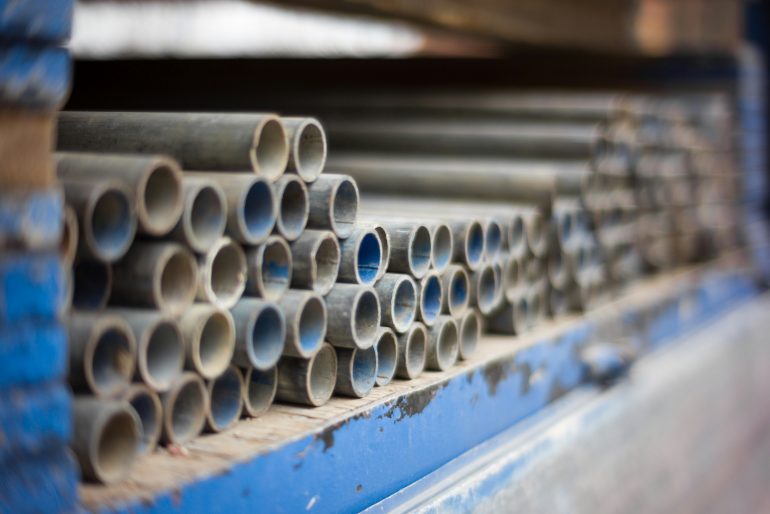Finding a reliable steel pipe supplier shouldn’t be complicated, but somehow it often is. Whether you’re managing a commercial build, residential development, or infrastructure project, the supplier you choose can make or break your timeline and budget. Get it wrong, and you’re dealing with delays, quality issues, or both.
The cheapest quote isn’t always the best deal, and the biggest supplier isn’t always the most reliable. Here’s what actually matters when you’re selecting someone to supply steel pipe for your project.
Product Range and Availability
A supplier’s inventory tells you a lot about their operation. Can they provide what you need when you need it, or will you be waiting weeks for special orders?
Good suppliers stock common sizes and grades because they understand construction timelines don’t allow for long lead times on standard materials. If you need 100mm structural steel pipe or standard plumbing-grade materials, these should be readily available. Less common specifications might require ordering, but the supplier should be upfront about realistic timeframes.
Here’s the thing – suppliers who only stock a narrow range of products often can’t handle projects that have varied requirements. You don’t want to be sourcing structural pipe from one place, stainless from another, and galvanized from a third. That’s a logistics nightmare.
Ask potential suppliers about their typical stock levels and what they can source if needed. A supplier with strong industry connections can usually get specialty items faster than one operating in isolation.
Quality Standards and Certification
Steel pipe isn’t all created equal, and the consequences of substandard materials can be serious. Structural failures, code violations, and failed inspections are expensive problems that trace back to material quality.
Reputable suppliers should provide materials that meet governmental standards and be able to supply mill certificates or test reports when required. This documentation proves the steel meets the specified grades and properties. For projects requiring compliance verification, having Aarbro steel pipe suppliers who understand certification requirements and can provide proper documentation saves headaches during inspections.
Don’t assume all suppliers are equally rigorous about quality control. Some cut corners by sourcing cheaper materials that might not meet standards. If a price seems too good to be true compared to other quotes, question why. The savings aren’t worth it if you’re dealing with rejected materials or structural issues later.
Delivery Reliability
Material delays cascade through construction schedules, affecting labor, equipment, and other trades. A supplier who can’t deliver on time costs you more than just the price of the steel.
When evaluating suppliers, ask about their delivery capabilities. Do they have their own trucks or rely on third-party logistics? What’s their track record for on-time delivery? Can they handle urgent orders when plans change?
The problem is, you often don’t know about delivery issues until you’re already committed to a supplier and halfway through a project. That’s why references matter. Talk to other builders and contractors about their experiences. Late deliveries are a common complaint, and you’ll hear about it quickly if a supplier has consistent problems.
Also consider location. A supplier that’s hours away might offer good prices, but freight costs and delivery times add up. Sometimes paying slightly more for a closer supplier makes better business sense.
Pricing Structure and Transparency
Steel prices fluctuate based on raw material costs, currency exchange, and market demand. Suppliers can’t control these factors, but they can be transparent about how they price materials.
Watch out for suppliers who provide vague quotes or have hidden fees that appear later. Freight charges, cutting fees, handling charges – these should all be clear upfront. A detailed quote that breaks down costs is much better than a single line item that doesn’t explain what you’re actually paying for.
Volume matters too. If you’re a regular customer or placing large orders, most suppliers offer better rates. Don’t be afraid to negotiate, especially on bigger projects. But also understand that rock-bottom pricing often means something’s being sacrificed – usually quality or service.
Some suppliers offer trade accounts with payment terms, which helps with cash flow on larger projects. If you’re running multiple jobs, having 30-day payment terms instead of payment on delivery can make a real difference to your working capital.
Technical Knowledge and Support
A supplier who understands construction applications can be genuinely helpful, not just an order-taker. They should be able to answer questions about which grade of steel suits your application, what wall thickness you need for structural loads, or whether galvanized or stainless makes more sense for a specific environment.
This technical knowledge becomes valuable when you’re specifying materials for a project or solving problems in the field. Sometimes you realize partway through that the specified material isn’t quite right, and a knowledgeable supplier can suggest alternatives that meet requirements without requiring design changes.
Suppliers who only read from a catalog without understanding applications aren’t adding much value. You want someone who can have a conversation about your project needs, not just process orders.
Stock Management and Ordering Process
How easy is it to actually order from this supplier? Can you call, email, or order online? Do they confirm orders promptly and provide tracking information?
These might seem like small details, but they matter when you’re juggling multiple projects and need to place orders quickly. Suppliers with efficient systems make your job easier. Those with chaotic processes waste your time.
Also consider how they handle issues. Damaged deliveries happen. Wrong materials get sent sometimes. The question is how quickly and professionally the supplier resolves these problems. A supplier who makes returns difficult or argues about obvious errors isn’t worth the hassle, regardless of their prices.
Building Long-Term Relationships
Construction businesses thrive on relationships with reliable suppliers. Finding a steel pipe supplier who consistently delivers quality materials on time at fair prices is worth maintaining.
Once you’ve found a good supplier, treat that relationship as valuable. Regular communication, prompt payment, and reasonable expectations on both sides create partnerships that benefit everyone. Good suppliers prioritize their reliable customers when materials are scarce or schedules are tight.
The construction industry runs on trust and reputation. Suppliers talk to each other, and so do contractors. Being a difficult customer can limit your options, just as being a difficult supplier loses business.
Making the Decision
Choosing a steel pipe supplier requires balancing several factors – quality, price, reliability, and service all matter. The right choice depends on your specific needs and priorities.
For smaller jobs, price and convenience might drive decisions. For larger projects with strict specifications and tight schedules, reliability and quality become more important. Most construction businesses end up working with a few trusted suppliers for different needs rather than putting all their eggs in one basket.
Take time to evaluate options properly. Check references, compare detailed quotes, and start with smaller orders to test reliability before committing to larger projects. The effort spent finding the right supplier pays off in smoother projects and fewer headaches down the line.




